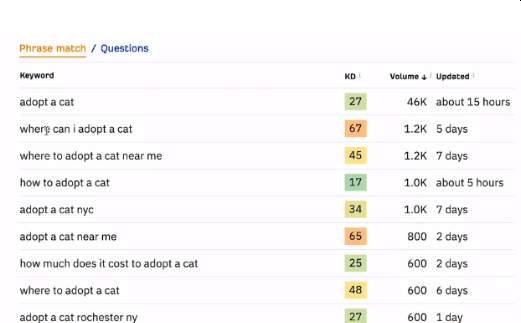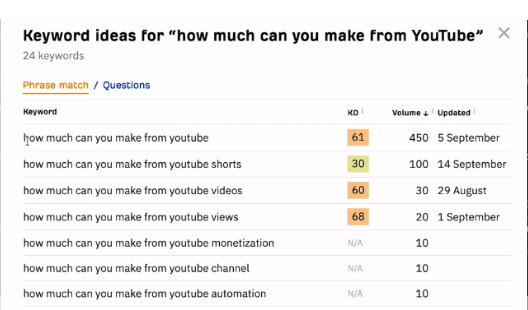Keyword research is the foundation of a successful SEO strategy, helping businesses and content creators understand what their audience is searching for online. By identifying the right keywords, you can optimize your content to rank higher in search engine results, drive organic traffic, and reach your target audience effectively. This introduction to keyword research will guide you through the basics, including how to find, analyze, and implement keywords that align with user intent and search trends.
Our introduction to keyword research will help you uncover the best search terms to enhance your SEO strategy and reach your target audience.
Table of Contents
ToggleIntroduction to Keyword Research
When it comes to keyword research, a lot of people make this process more complicate than it needs. In my opinion, it boils down to three things:
This introduction to keyword research will help you understand how to find and use the right keywords to improve your SEO strategy and drive more organic traffic.
1. Search Volume
Are other people searching for this keyword? because if nobody is searching for this keyword you will get no visitors. So keywords with no search volume are not good keywords. But if a keyword has search volume, the next thing we will look out for is the:
An introduction to keyword research is the first step in optimizing your content for better search engine rankings and increased organic traffic.
2. Level of Competition
Competition is the number of authoritastive sites your site is trying to outrank for a particular keyword. If the sites that are ranking on the first page for a perticular keyword are government sites, well-known publication sites then the keyword is very competitive. But, if the top ten positions are sites that you have not seen before, niche sites, foreign sites like Quora or Reddit then the keyword has low competition.
Now, if a keyword has an acceptable level of competition, the third thing we look out for is:
This introduction to keyword research will teach you how to find high-impact keywords to boost your website’s search rankings and visibility.
3. Beneficial to Business or Blog
It will either bring revenue or allow you to grow your authority in your niche or industry.
As you already know, depending on the search intent not all keywords come with buying intent and not all keywords matter to your business or blog.
For example, if your business is about selling sports shoes, will talking about men’s dress shoes matter, probably not.

An introduction to keyword research is essential for anyone looking to improve their SEO strategy and attract the right audience online.
So, even if a keyword has search volume, has an ecceptable level of competition but is not directly beneficial to your blog, you don’t want to target that keyword.

Unless a keyword helps you build your authority such as the sports shoe example a keyword that may help your authority could be “Can Sports Shoes be used for Trekking” or “How to Choose Sports Shoe Size”.
So, three things:
- Search Volume
which means that people are searching for the keyword. - Level of Competition not too difficult to rank for.
- Beneficial to Business or Blog will it build authority
Keyword Research
Now, the next thing you need to know, when you are doing keyword research, is you often come across different keywords with the same meaning and same search intent but different search volume.

For example. I’ll go onto the free AHrefs Keyword Generator and I’ll search for “adopt a cat”, you see “where can I adopt a cat” has a search volume of 1200, but there is another keyword “where to adopt a cat” that has the same meaning, the same search intent, but the search volume is only 600.

Does this mean you should create an article for each keyword, I’ll let you know in a while.
Another example is “how much can you make from YouTube” that’s five keywords and you will see this keyword has about 450 people searching for it every month, “how much can you make from YouTube videos” has a search volume of 30, “how much can you make from youtube views” about 20 search volume but, if you think about it, they all mean the same thing. People searching for these keywords have the same search intent.

Does that mean you should create seperate articles to tackle each keyword that has the same meaning and search intent. The answer is NO. Because the meat of the contents for both articles is going to be the same.
Keyword Cannibalization
There is an SEO term for this: “Keyword Cannibalization” where you create seperate articles to target keywords with the same meaning and search intent. So, don’t fall into this category. The best way to tell if multiple keywords have the same meaning and search intent is simply do a Google search.
For example, as you can see, I’ve done as search for “how much can you make from youtube” and a search for “how much can you make from youtube views”. Check out the search results, you see the featured snippets for both are the same and the pages that rank for these two keywords are similar.
So, Google is telling you that these keywords have the same meaning, so if you create two different articles there is a high likelihood that they will not rank as you are confusing them or showing signs of being spammy. Search engines don’t like that.

So, in a situation where you find good keywords that have the same meaning and search intent. You want to write just one article to serve one search intent. This means that the one article you create ranks for many keywords that serve the same meaning and search intent.
This is very common if you use tools like Ahrefs, Semrush or any keyword research tool. They display whatever keywords people have typed in the search engines.




